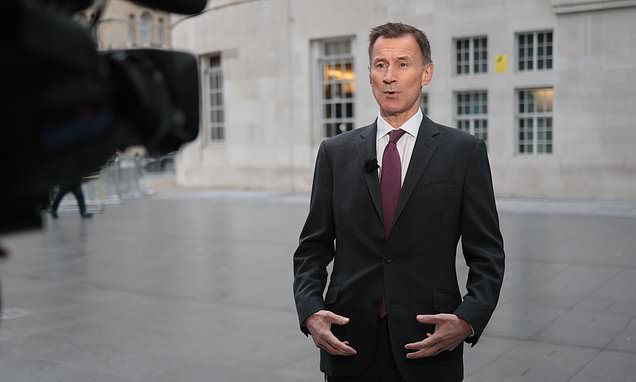
Capital gains and inheritance tax are set to rake in £170billion over six years, while critics accuse government of ‘relentlessly squeezing wealth-creators’
- The amount families will pay in capital gains and inheritance tax is set to soar
- Critics said the taxes were ‘inefficient’ and acted as a form of ‘double taxation’
Wealth taxes will cost families more than £170billion over the next six years in a major windfall for the Treasury.
The amount households will pay in capital gains and inheritance tax is set to soar, Budget documents show, spelling misery for millions.
Critics said the taxes were ‘inefficient’ and acted as a form of ‘double taxation’ on investors and entrepreneurs.
Jeremy Hunt has not moved to increase capital gains or inheritance tax, but he and previous chancellors have overseen massive increases in the amount HM Revenue and Customs collects from them.
Last year the Treasury took £21.4billion from the levies – almost two-thirds higher than five years ago. In 2027/28 the taxes are expected to bring in £34.5billion – another 61 per cent jump.
Jeremy Hunt has not moved to increase capital gains or inheritance tax, but he and previous chancellors have overseen massive increases in the amount HM Revenue and Customs collects from them
In total, for the six years from 2022/23 to 2027/28, the Office for Budget Responsibility (OBR) has pencilled in £45billion from inheritance tax and £126.1billion through capital gains.
The double whammy represents a £171.1billion wealth tax on households –£37.3billion higher than the OBR’s November forecast suggested.
Former business secretary Jacob Rees-Mogg said: ‘Capital taxes are an inefficient form of taxation. Capital gains tax is voluntary as the asset does not have to be sold so it distorts investment decisions and uses capital inefficiently.
‘Death duties are double taxation but also encourage investment for tax minimisation rather than economic efficiency lowering the opportunities for growth.’
Matthew Lesh, the director of public policy at the Institute of Economic Affairs think-tank, accused the Government of ‘relentlessly squeezing wealth-creators and entrepreneurs’.
He added: ‘Capital gains tax is a tax on investment, while inheritance tax is a tax on working longer and harder.’
Capital gains tax is the levy paid on profits made when an asset, such as a holiday home or shares, is sold.
Higher-rate taxpayers pay 28 per cent on gains made on residential property and 20 per cent on other assets.
Former business secretary Jacob Rees-Mogg said: ‘Capital taxes are an inefficient form of taxation’
Critics have also claimed inheritance tax is increasingly a tax on middle classes. Currently, estates worth up to £325,000 can be passed on without paying inheritance tax, with a levy of 40 per cent above that threshold.
The Government said Britain’s tax system ‘is fair’ with half of capital gains taxes paid by the wealthiest 1 per cent.
Source: Read Full Article

